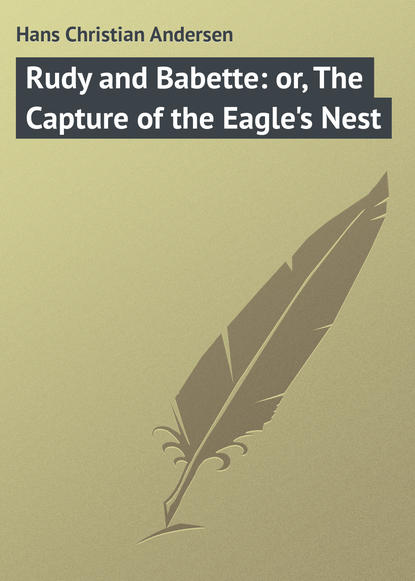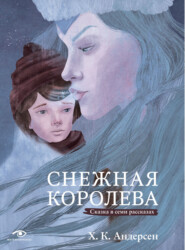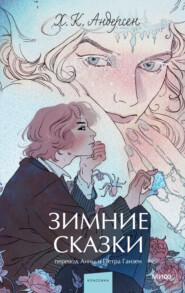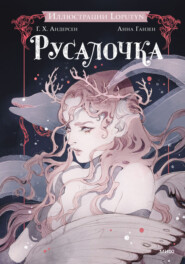По всем вопросам обращайтесь на: info@litportal.ru
(©) 2003-2024.
✖
Rudy and Babette: or, The Capture of the Eagle's Nest
Настройки чтения
Размер шрифта
Высота строк
Поля
And at the same moment he vanished.
The wedding rejoicings now lasted a full month. Johannes and the princess loved each other dearly, and the old king lived to see many a happy day, and dandled his little grand-children on his knee, and let them play with his scepter. And Johannes became king over the whole land.
THE OLD BACHELOR'S NIGHTCAP
THERE is a street in Copenhagen oddly named Hysken Strâde, and one naturally asks what Hysken signifies, and why Hysken at all. Common report says it is a German word, but in justice to the German tongue this is not the case, since it would then have been Hauschen, of which Hysken is the Danish corruption, and it means "the street of tiny houses."
For many a year it consisted of nothing but wooden booths, such as may be seen to this day in the market-place; possibly they were a little larger. The window-panes were not of glass, but horn, for at that time glass was too expensive for general use. Remember, we are speaking of many years ago. Your great-grandfather would have called them "the olden times." Yes, several hundred years ago.
Trade in Copenhagen was entirely, or nearly so, in the hands of wealthy Bremen and Lübeck merchants, whose clerks (for they themselves stayed at home) lived in the Hysken Sträde, in the booths of this street of tiny houses, and sold beer and groceries. Delicious German beer it was too, and all kinds for sale – Bremen, Prussian, and Brunswick, and spices of every variety – saffron, aniseed, ginger and above all pepper. Indeed, this was the staple commodity – hence the German clerks in Denmark acquired the nickname Pepper-folk – and since they were bound not to marry whilst in that country, many grew old and gray in service, and, as they performed their own domestic services themselves they became crabbed old fellows with whimsical ideas. This being so, it became usual to dub all crotchety old bachelors "pepper-fogeys," an expression now naturalized into the German language. This must be borne in mind if you would understand what follows.
These pepper-fogeys used to be unmercifully ridiculed, and told to pull down a nightcap over their ears and toddle off to bed, and many are the doggerel verses in which the nightcap figures. Yes, fun was poked at the pepper-fogeys with their nightcaps, just because they were so little known. And why should not one wish for a nightcap? you may ask. Listen, and I will tell you.
Hauschen Street was in those days unpaved, and wayfarers stumbled along as if it were a little side-alley. So narrow indeed was it, and so huddled together the booths, that in summertime a sail would be stretched from side to side, and strong was the fragrance of saffron and ginger pervading the stalls, behind which there served for the most part old men. They were not, however, clothed, as in the portraits of our ancestors, with peruke, knee-breeches, elegant waistcoat and tunic of ample cut, as you might suppose.
No, these old pepper-fogeys were no dandies to be portrayed on canvas, though one could well wish to have a picture of one as he stood at the counter, or betook himself with leisurely gait to church on holy days. A broad-brimmed hat, high in the crown, in which maybe the younger among them would sport a feather, a woolen shirt beneath a wide flapping collar, a close-fitting jacket, a loose cloak worn over it, and the trousers tucked into the broadly-peaked shoes, for stockings had they none. At his belt a knife and fork, and a larger knife for self-defense – a necessary precaution in those days.
Such was the costume of old Anthony, one of the oldest of the pepper-fogeys, only in place of the broad-brimmed high-crowned hat he always wore a sort of bonnet, under which was a knitted skullcap, a veritable nightcap, which never left his head. One or other, for he had two, was always on his head day and night. He formed a perfect study for an artist, so lean and wizened was he, so wrinkled his brow, his fingers so skinny, his eyebrows so bushy. He was said to be a native of Bremen; but in truth, though his master was, old Anthony was born at Eisenach, hard by the Wartburg. He never told the others, but pondered over it the more.
The old fellows did not often come together. He stayed in his own room, a dim light penetrating the opaque window-panes. Seated on the bed, he chanted his evening psalm. Theirs was not a happy lot – strangers in a strange land, heeded by none, save to be brushed aside when in the way.
On black nights, when the rain was pelting down outside, it was far from cosy within. Not a lamp visible, save that which threw a light on a picture of the Virgin painted on the wall. Hark to the rain beating in torrents on the masonry of the castle-wharf! Such evenings were long and dreary without some task. To arrange and rearrange things in the house, to make paper bags, to polish scales, is not work for every day. One must find other things to do, as did old Anthony. He would darn his clothes, and patch up his boots. And when at last he went to bed, true to his habit, down he would draw his nightcap, but soon raised it to see the candle was quite extinguished. He would snuff out the wick between finger and thumb, pull down his nightcap, and turn over to sleep. But it occurred to him to see if the ashes on the little hearth in the corner were quite burnt out; if they were damped enough, lest a stray spark should kindle a fire, and do damage.
Up he would get again, creep down the ladder (for steps they could not be called), and finding not a spark in the ash-pan, would go back in peace. But before he was half in bed he would have a doubt whether the bolts and shutters of the shop were secured, and down once more went the tottering feet, his teeth a-chattering with the cold, for never such biting frost as in late winter. Then, pulling up the coverlet and drawing down his nightcap, he would dismiss all thoughts of business and the day's toil from his mind. But no happier than before – old memories would weave their fantastic shapes before his fancy, and a many thorn lay hidden in the garlands.
When one pricks one's finger tears brim to the eyelids, and oftentimes old Anthony shed hot and bitter tears, that glistened like pearls. The largest pearls would fall on the coverlet with so sad a sound that it seemed his heart's strings were breaking.
Brightly would they glisten and illumine pictures of his childhood, never fading memories.
As he dried his tears on the nightcap, the scenes would vanish, but not the source of his tears: that lay deep in his heart.
The scenes did not follow the natural sequence of life; the saddest and most joyful together, but the last had the deepest shadows.
The beech forests of Denmark are admitted by all to be fine, but fairer still to the eyes of old Anthony were those around the Wartburg. More majestic and lofty the aged trees around the baronial castle, where the foliage of creepers trailed over the stone buttresses. Sweeter there the perfume of apple-blossoms. Vividly did he call them to mind, and a shining tear rolled down his cheek, wherein he saw two children, a boy and a girl, at play. The boy, rosy-cheeked and curly-haired, with clear blue eyes, was himself, the little Anthony. The girl had brown eyes, dark hair, and a merry, bright expression. She was the Burgomaster's daughter, Molly. The children were playing with an apple, which they shook to hear the pips rattle inside. They shared the apple and ate it up, all but one pip, which the little girl proposed they should plant in the earth.
"Then you will see something you'd never think of," said she; "an apple tree will grow, but not all at once." So they busied themselves planting it in a flower-pot. He made a hole, and she laid the pip in, and both heaped on the earth.
"Mind," said she, "you don't dig up the pip to see if it has struck root. Indeed, you mustn't. I did so – only twice – because I knew no better, and the flowers withered." Anthony kept the flower-pot, and every day the winter through watched it, but nothing was to be seen but the black earth. Then came the spring and warm sunshine, and two little twigs peeped forth from the pot. "Oh, how lovely!" cried Anthony, "they are for Molly and me."
Soon came another shoot; whom could that represent? Then another and yet another, and every week it grew, till it became a big plant. All this was mirrored in a single tear. Brush it away as he might, the source dwelled deep in his bosom.
Not far from Eisenach is a ridge of rocky heights, treeless and bare, known as the Venusberg.
Here was the abode of Venus, goddess of heathen mythology, known also to every child round about as Lady Holle. She it was who lured the knightly Tannhäuser, the minstrel of the Wartburg, to her mountain.
Little Molly and Anthony would ofttimes stand at the foot of the mountain, and one day she asked him, "Do you dare knock and say, 'Lady Holle! Lady Holle! open the door. Tannhäuser is here'?" But Anthony was afraid, only his playmate ventured.
"Lady Holle! Lady Holle!" she cried, loud and clear, but the rest so low and indistinct that he believed that she did not utter it. She looked so winning and was of such high spirit. When they were at play with other children in the garden, Molly alone of them all would dare to kiss him, just because he was unwilling and resisted. "I dare kiss him," she would cry, and throw her arms round his neck, and the boy would submit to her embrace, for how charming, how saucy she was, to be sure!
Lady Holle, so people said, was beautiful, but her beauty was that of a wicked temptress. The noblest type of beauty was that of the devout Elizabeth, tutelary saint of the land, the pious lady whose gracious actions were known near and far. Her picture hangs in the chapel lit up by silver lamps, but she and Molly bore no resemblance to one another.
The apple tree they had planted grew year by year till it was so large it had to be planted anew in the open air, where the dew fell and the sun shed his warm rays; and it flourished and grew hardy, and could bear the wintry blast, blossoming in the springtide as if for very joy. In the autumn it bore two apples – one for Molly, one for Anthony. Rapidly grew the tree, and with it grew Molly, fresh as one of its blossoms; but not for long was Anthony fated to watch this fair flower.
All things here on earth are subject to change.
Molly's father left the old home and went afar. Nowadays, by the railroad, it takes but some few hours, but in those times over a day and night, to travel so far east as to Weimar.
Both Molly and Anthony cried, and she told him he was more to her than all the fine folk in Weimar could be.
A year passed by – two, three years – and only two letters came: the first sent by a letter-carrier, the other by a traveler – a long and devious way by town and hamlet.
How often had he and Molly together read the story of Tristan and Isolde, and bethought them the name Tristan meant "conceived in tribulation." But with Anthony no such thought could be harbored as "She has forsaken me."
True, Isolde did not forsake Tristan; buried side by side in the little churchyard, the lime trees met and entwined over their graves. Anthony loved this story, sad though it was.
But no sad fate could await him and Molly, and blithely he sang as he rode in the clear moonlight towards Weimar to visit Molly.
He would fain come unexpected, and unexpected he came.
And welcome they made him. Wine-cups filled to the brim, distinguished company, a comfortable room, all these he found, but it was not as he had pictured it, dreamed of it.
Poor Anthony could not make it out, could not understand them, but we can. We know how one may be in the midst of others and yet be solitary; how one talks as fellow-voyagers in a post-chaise, boring one another, and each wishing the other far away.
One day Molly spoke to him. "I am straight-forward, I will tell you all. Since we were playmates together much has altered. It is not only an outward change in me, you see. Habit and will do not control our affections. I wish you well, Anthony, and would not have you bitter towards me when I am far away, but love, deep love, I cannot feel for you. Fare thee well!"
So Anthony bade her farewell. No tear bedimmed his eye, but he felt he had lost a friend. Within four and twenty hours he was back in Eisenach; the horse that bore him, bore him no more.
"What matter?" said he, "I am lost. I will destroy whatever reminds me of the Lady Holle. The apple tree – I will uproot it, shatter it. Never more shall it bloom and bear fruit."
But the tree was not injured. Anthony lay on his bed, stricken with fever. What can avail him. Suddenly a medicine, the bitterest medicine known to man, cured his fever, convulsing body and soul. Anthony's father was no longer the rich merchant he had been!
Troublous days, days of trial, awaited them. Misfortune fell upon the home; the father, dogged by fate, became poor. So Anthony had other things to think about than the resentment he cherished in his heart towards Molly. He must take his father's place, he must go out into the great world and earn his bread.
He reached Bremen: hardship and dreary days were his lot – days that harden the heart or sometimes make it very tender. How he had misjudged his fellow-men in his young days! He became resigned and cheerful. God's way is best, was his thought. How had it been if heaven had not turned her affection to another before this calamity? "Thanks be to heaven," he would say. "She was not to blame, and I have felt so bitter towards her."
Time passed on. Anthony's father died, and strangers occupied the old home. But he was destined to see it once more. His wealthy master sent him on business that brought him once more to Eisenach, his native town.
The old Wartburg was unchanged – the monk and nun hewn on its stones. The grand old trees set off the landscape as of old. Over the valley the Venusberg rose, a gray mass in the twilight. He longed to say, "Lady Holle! Lady Holle! open the door to me. Fain would I stay forever." It was a sinful thought, and he crossed himself. Old memories crowded to his mind as he gazed with tear-bedewed eyes at the town of childhood's days. The old homestead stood unchanged, but the garden was not the same. A roadway crossed one corner of it. The apple tree, which he had not destroyed, was no longer in the garden, but across the way.
Still, as of old, bathed in sunshine and dew, the old tree bore richly, and its boughs were laden with fruit. One of its branches was broken. Wilful hands had done this, for the tree now stood by the highway.
Passers-by plucked its blossoms, gathered its fruit, and broke its branches. Well might one say, as one says of men, "This was not its destiny as it lay in its cradle." So fair its prospects, that this should be the end! Neglected, forsaken, no longer tended, there between field and highway it stood – bare to the storm, shattered and rent. As the years roll by it puts forth fewer blossoms, less fruit – and its story comes to a close!
So mused Anthony many a lonely evening in his room in the wooden booth in a strange land, in the narrow street in Copenhagen, whither his rich master sent him bound by his vow not to marry.
Marriage, forsooth, for him! Ha, ha! he laughed a strange laugh.
The winter was early that year with sharp frost. Outside raged a blinding snowstorm, so that every one that could stayed indoors. And so it befell that his neighbors never saw that for two days his shop was unopened, nor Anthony been seen, for who would venture out if not compelled to?
The wedding rejoicings now lasted a full month. Johannes and the princess loved each other dearly, and the old king lived to see many a happy day, and dandled his little grand-children on his knee, and let them play with his scepter. And Johannes became king over the whole land.
THE OLD BACHELOR'S NIGHTCAP
THERE is a street in Copenhagen oddly named Hysken Strâde, and one naturally asks what Hysken signifies, and why Hysken at all. Common report says it is a German word, but in justice to the German tongue this is not the case, since it would then have been Hauschen, of which Hysken is the Danish corruption, and it means "the street of tiny houses."
For many a year it consisted of nothing but wooden booths, such as may be seen to this day in the market-place; possibly they were a little larger. The window-panes were not of glass, but horn, for at that time glass was too expensive for general use. Remember, we are speaking of many years ago. Your great-grandfather would have called them "the olden times." Yes, several hundred years ago.
Trade in Copenhagen was entirely, or nearly so, in the hands of wealthy Bremen and Lübeck merchants, whose clerks (for they themselves stayed at home) lived in the Hysken Sträde, in the booths of this street of tiny houses, and sold beer and groceries. Delicious German beer it was too, and all kinds for sale – Bremen, Prussian, and Brunswick, and spices of every variety – saffron, aniseed, ginger and above all pepper. Indeed, this was the staple commodity – hence the German clerks in Denmark acquired the nickname Pepper-folk – and since they were bound not to marry whilst in that country, many grew old and gray in service, and, as they performed their own domestic services themselves they became crabbed old fellows with whimsical ideas. This being so, it became usual to dub all crotchety old bachelors "pepper-fogeys," an expression now naturalized into the German language. This must be borne in mind if you would understand what follows.
These pepper-fogeys used to be unmercifully ridiculed, and told to pull down a nightcap over their ears and toddle off to bed, and many are the doggerel verses in which the nightcap figures. Yes, fun was poked at the pepper-fogeys with their nightcaps, just because they were so little known. And why should not one wish for a nightcap? you may ask. Listen, and I will tell you.
Hauschen Street was in those days unpaved, and wayfarers stumbled along as if it were a little side-alley. So narrow indeed was it, and so huddled together the booths, that in summertime a sail would be stretched from side to side, and strong was the fragrance of saffron and ginger pervading the stalls, behind which there served for the most part old men. They were not, however, clothed, as in the portraits of our ancestors, with peruke, knee-breeches, elegant waistcoat and tunic of ample cut, as you might suppose.
No, these old pepper-fogeys were no dandies to be portrayed on canvas, though one could well wish to have a picture of one as he stood at the counter, or betook himself with leisurely gait to church on holy days. A broad-brimmed hat, high in the crown, in which maybe the younger among them would sport a feather, a woolen shirt beneath a wide flapping collar, a close-fitting jacket, a loose cloak worn over it, and the trousers tucked into the broadly-peaked shoes, for stockings had they none. At his belt a knife and fork, and a larger knife for self-defense – a necessary precaution in those days.
Such was the costume of old Anthony, one of the oldest of the pepper-fogeys, only in place of the broad-brimmed high-crowned hat he always wore a sort of bonnet, under which was a knitted skullcap, a veritable nightcap, which never left his head. One or other, for he had two, was always on his head day and night. He formed a perfect study for an artist, so lean and wizened was he, so wrinkled his brow, his fingers so skinny, his eyebrows so bushy. He was said to be a native of Bremen; but in truth, though his master was, old Anthony was born at Eisenach, hard by the Wartburg. He never told the others, but pondered over it the more.
The old fellows did not often come together. He stayed in his own room, a dim light penetrating the opaque window-panes. Seated on the bed, he chanted his evening psalm. Theirs was not a happy lot – strangers in a strange land, heeded by none, save to be brushed aside when in the way.
On black nights, when the rain was pelting down outside, it was far from cosy within. Not a lamp visible, save that which threw a light on a picture of the Virgin painted on the wall. Hark to the rain beating in torrents on the masonry of the castle-wharf! Such evenings were long and dreary without some task. To arrange and rearrange things in the house, to make paper bags, to polish scales, is not work for every day. One must find other things to do, as did old Anthony. He would darn his clothes, and patch up his boots. And when at last he went to bed, true to his habit, down he would draw his nightcap, but soon raised it to see the candle was quite extinguished. He would snuff out the wick between finger and thumb, pull down his nightcap, and turn over to sleep. But it occurred to him to see if the ashes on the little hearth in the corner were quite burnt out; if they were damped enough, lest a stray spark should kindle a fire, and do damage.
Up he would get again, creep down the ladder (for steps they could not be called), and finding not a spark in the ash-pan, would go back in peace. But before he was half in bed he would have a doubt whether the bolts and shutters of the shop were secured, and down once more went the tottering feet, his teeth a-chattering with the cold, for never such biting frost as in late winter. Then, pulling up the coverlet and drawing down his nightcap, he would dismiss all thoughts of business and the day's toil from his mind. But no happier than before – old memories would weave their fantastic shapes before his fancy, and a many thorn lay hidden in the garlands.
When one pricks one's finger tears brim to the eyelids, and oftentimes old Anthony shed hot and bitter tears, that glistened like pearls. The largest pearls would fall on the coverlet with so sad a sound that it seemed his heart's strings were breaking.
Brightly would they glisten and illumine pictures of his childhood, never fading memories.
As he dried his tears on the nightcap, the scenes would vanish, but not the source of his tears: that lay deep in his heart.
The scenes did not follow the natural sequence of life; the saddest and most joyful together, but the last had the deepest shadows.
The beech forests of Denmark are admitted by all to be fine, but fairer still to the eyes of old Anthony were those around the Wartburg. More majestic and lofty the aged trees around the baronial castle, where the foliage of creepers trailed over the stone buttresses. Sweeter there the perfume of apple-blossoms. Vividly did he call them to mind, and a shining tear rolled down his cheek, wherein he saw two children, a boy and a girl, at play. The boy, rosy-cheeked and curly-haired, with clear blue eyes, was himself, the little Anthony. The girl had brown eyes, dark hair, and a merry, bright expression. She was the Burgomaster's daughter, Molly. The children were playing with an apple, which they shook to hear the pips rattle inside. They shared the apple and ate it up, all but one pip, which the little girl proposed they should plant in the earth.
"Then you will see something you'd never think of," said she; "an apple tree will grow, but not all at once." So they busied themselves planting it in a flower-pot. He made a hole, and she laid the pip in, and both heaped on the earth.
"Mind," said she, "you don't dig up the pip to see if it has struck root. Indeed, you mustn't. I did so – only twice – because I knew no better, and the flowers withered." Anthony kept the flower-pot, and every day the winter through watched it, but nothing was to be seen but the black earth. Then came the spring and warm sunshine, and two little twigs peeped forth from the pot. "Oh, how lovely!" cried Anthony, "they are for Molly and me."
Soon came another shoot; whom could that represent? Then another and yet another, and every week it grew, till it became a big plant. All this was mirrored in a single tear. Brush it away as he might, the source dwelled deep in his bosom.
Not far from Eisenach is a ridge of rocky heights, treeless and bare, known as the Venusberg.
Here was the abode of Venus, goddess of heathen mythology, known also to every child round about as Lady Holle. She it was who lured the knightly Tannhäuser, the minstrel of the Wartburg, to her mountain.
Little Molly and Anthony would ofttimes stand at the foot of the mountain, and one day she asked him, "Do you dare knock and say, 'Lady Holle! Lady Holle! open the door. Tannhäuser is here'?" But Anthony was afraid, only his playmate ventured.
"Lady Holle! Lady Holle!" she cried, loud and clear, but the rest so low and indistinct that he believed that she did not utter it. She looked so winning and was of such high spirit. When they were at play with other children in the garden, Molly alone of them all would dare to kiss him, just because he was unwilling and resisted. "I dare kiss him," she would cry, and throw her arms round his neck, and the boy would submit to her embrace, for how charming, how saucy she was, to be sure!
Lady Holle, so people said, was beautiful, but her beauty was that of a wicked temptress. The noblest type of beauty was that of the devout Elizabeth, tutelary saint of the land, the pious lady whose gracious actions were known near and far. Her picture hangs in the chapel lit up by silver lamps, but she and Molly bore no resemblance to one another.
The apple tree they had planted grew year by year till it was so large it had to be planted anew in the open air, where the dew fell and the sun shed his warm rays; and it flourished and grew hardy, and could bear the wintry blast, blossoming in the springtide as if for very joy. In the autumn it bore two apples – one for Molly, one for Anthony. Rapidly grew the tree, and with it grew Molly, fresh as one of its blossoms; but not for long was Anthony fated to watch this fair flower.
All things here on earth are subject to change.
Molly's father left the old home and went afar. Nowadays, by the railroad, it takes but some few hours, but in those times over a day and night, to travel so far east as to Weimar.
Both Molly and Anthony cried, and she told him he was more to her than all the fine folk in Weimar could be.
A year passed by – two, three years – and only two letters came: the first sent by a letter-carrier, the other by a traveler – a long and devious way by town and hamlet.
How often had he and Molly together read the story of Tristan and Isolde, and bethought them the name Tristan meant "conceived in tribulation." But with Anthony no such thought could be harbored as "She has forsaken me."
True, Isolde did not forsake Tristan; buried side by side in the little churchyard, the lime trees met and entwined over their graves. Anthony loved this story, sad though it was.
But no sad fate could await him and Molly, and blithely he sang as he rode in the clear moonlight towards Weimar to visit Molly.
He would fain come unexpected, and unexpected he came.
And welcome they made him. Wine-cups filled to the brim, distinguished company, a comfortable room, all these he found, but it was not as he had pictured it, dreamed of it.
Poor Anthony could not make it out, could not understand them, but we can. We know how one may be in the midst of others and yet be solitary; how one talks as fellow-voyagers in a post-chaise, boring one another, and each wishing the other far away.
One day Molly spoke to him. "I am straight-forward, I will tell you all. Since we were playmates together much has altered. It is not only an outward change in me, you see. Habit and will do not control our affections. I wish you well, Anthony, and would not have you bitter towards me when I am far away, but love, deep love, I cannot feel for you. Fare thee well!"
So Anthony bade her farewell. No tear bedimmed his eye, but he felt he had lost a friend. Within four and twenty hours he was back in Eisenach; the horse that bore him, bore him no more.
"What matter?" said he, "I am lost. I will destroy whatever reminds me of the Lady Holle. The apple tree – I will uproot it, shatter it. Never more shall it bloom and bear fruit."
But the tree was not injured. Anthony lay on his bed, stricken with fever. What can avail him. Suddenly a medicine, the bitterest medicine known to man, cured his fever, convulsing body and soul. Anthony's father was no longer the rich merchant he had been!
Troublous days, days of trial, awaited them. Misfortune fell upon the home; the father, dogged by fate, became poor. So Anthony had other things to think about than the resentment he cherished in his heart towards Molly. He must take his father's place, he must go out into the great world and earn his bread.
He reached Bremen: hardship and dreary days were his lot – days that harden the heart or sometimes make it very tender. How he had misjudged his fellow-men in his young days! He became resigned and cheerful. God's way is best, was his thought. How had it been if heaven had not turned her affection to another before this calamity? "Thanks be to heaven," he would say. "She was not to blame, and I have felt so bitter towards her."
Time passed on. Anthony's father died, and strangers occupied the old home. But he was destined to see it once more. His wealthy master sent him on business that brought him once more to Eisenach, his native town.
The old Wartburg was unchanged – the monk and nun hewn on its stones. The grand old trees set off the landscape as of old. Over the valley the Venusberg rose, a gray mass in the twilight. He longed to say, "Lady Holle! Lady Holle! open the door to me. Fain would I stay forever." It was a sinful thought, and he crossed himself. Old memories crowded to his mind as he gazed with tear-bedewed eyes at the town of childhood's days. The old homestead stood unchanged, but the garden was not the same. A roadway crossed one corner of it. The apple tree, which he had not destroyed, was no longer in the garden, but across the way.
Still, as of old, bathed in sunshine and dew, the old tree bore richly, and its boughs were laden with fruit. One of its branches was broken. Wilful hands had done this, for the tree now stood by the highway.
Passers-by plucked its blossoms, gathered its fruit, and broke its branches. Well might one say, as one says of men, "This was not its destiny as it lay in its cradle." So fair its prospects, that this should be the end! Neglected, forsaken, no longer tended, there between field and highway it stood – bare to the storm, shattered and rent. As the years roll by it puts forth fewer blossoms, less fruit – and its story comes to a close!
So mused Anthony many a lonely evening in his room in the wooden booth in a strange land, in the narrow street in Copenhagen, whither his rich master sent him bound by his vow not to marry.
Marriage, forsooth, for him! Ha, ha! he laughed a strange laugh.
The winter was early that year with sharp frost. Outside raged a blinding snowstorm, so that every one that could stayed indoors. And so it befell that his neighbors never saw that for two days his shop was unopened, nor Anthony been seen, for who would venture out if not compelled to?

















